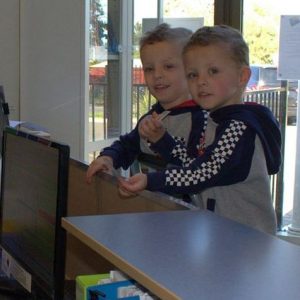 At Talking Matters we are passionate about parents making the most of teachable moments to help children learn. For children who visit us regularly whether for therapy or because they are waiting for a sibling, time spent in the waiting room is full of opportunities to learn valuable practical and social skills. We’ve added some special features to our waiting room to help parents out too!
At Talking Matters we are passionate about parents making the most of teachable moments to help children learn. For children who visit us regularly whether for therapy or because they are waiting for a sibling, time spent in the waiting room is full of opportunities to learn valuable practical and social skills. We’ve added some special features to our waiting room to help parents out too!
Here are some skills you can practice when you visit out waiting room:
1. Greeting people. Knowing how to make eye contact and speak confidently to people is an important social skill. We encourage children to greet our friendly reception staff, tell them their name and who they have come to see. We even have a step ladder at the counter so little people can make good eye contact as they speak. When they leave there is a card for them to take to the counter and collect their receipt, and say goodbye. This routine helps learn when it is time to leave all the fun things and go home. Parents please help children to use the ladder safely.
2. Sharing toys. Playing with toys in a public place is different to playing at home. You may not get the toy you want each time, you may have to share it with someone else and you have to put it back, rather than take it home. All these things are opportunities to learn sharing, negotiating and regulating your emotions when things don’t go how you would like. When children struggle to do the right thing, acknowledge their feelings then tell them clearly what they need to do, and then if needed distract them. "I know you like that car, but we need to put it back for next time". Some parents find it helpful to bring something from home to give their child if needed.
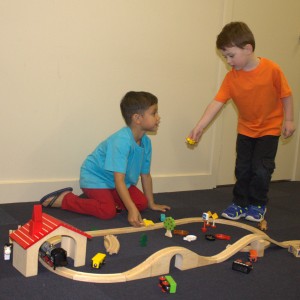 3. Playing together. If you attend regular appointments you will often meet the same people in the waiting room each week. This is a chance for children to practice playing together, learning skills such as turn taking, joint attention and pretending. Children who are just learning these skills will need some support from an adult to know how to do this so you may need to join in the play and help your child learn what to do.
3. Playing together. If you attend regular appointments you will often meet the same people in the waiting room each week. This is a chance for children to practice playing together, learning skills such as turn taking, joint attention and pretending. Children who are just learning these skills will need some support from an adult to know how to do this so you may need to join in the play and help your child learn what to do.
4. Waiting As we go through life we spend a lot of time waiting, and knowing how to do this well is a useful skill. Children attending sessions usually only have to wait a few minutes but siblings may have to wait longer. Think about things that your child can do while they wait to help them be calm and quiet. Plan your time beforehand and allow your child to choose a favourite book or quiet toy to take with them. If your child gets restless, acknowledging their feelings, then offering a distraction will help. You can use this opportunity to teach your child about time concepts, by showing them on the clock when your session will start and finish. Older children might find their own watch helpful. If your child needs to move about you are welcome to use our front garden with playground equipment and take one of our buzzers with you so we can call you when you are needed. Don't forget to praise your child for patient behaviour.
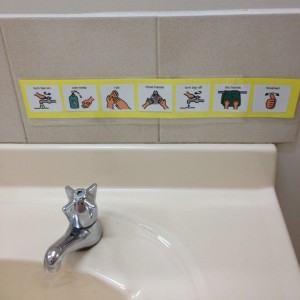 5. Using a public toilet. Using a public toilet is different from using the toilet at home. Things are less familiar and there are extra rules such as needing to make sure you close the door and sometimes waiting to take your turn. Our child friendly toilets have a visual schedule about how to use the toilet, flush then wash and dry your hands, so take this opportunity to help little people learn how to work though this important routine.
5. Using a public toilet. Using a public toilet is different from using the toilet at home. Things are less familiar and there are extra rules such as needing to make sure you close the door and sometimes waiting to take your turn. Our child friendly toilets have a visual schedule about how to use the toilet, flush then wash and dry your hands, so take this opportunity to help little people learn how to work though this important routine.
6. Being tolerant of others. We work with children from all kinds of backgrounds and abilities and sometimes your child may see another child who is different in some way from what they are used to or who does something they see as unusual. This is a great opportunity to broaden your child's view of the world by explaining that all people are different. If your child questions another child's behaviour you can explain to them, discreetly and respectfully, that all people are different and that some children need more time and help to do some things than others. Young children can be blunt and this is also a good time to teach your child that it is not polite to talk about others in public but that they can ask you questions later on in the car or at home if they wish.
7. Using your inside voice. While there are opportunities to play in the waiting room, it is also a place where people are working and learning. This is a good chance to talk to your child about using their "inside voice". You can explain to them that some children are learning in the other rooms and need quiet to concentrate. You can also point out to them that the receptionists often need to listen to people on the phone. You could explain to them when they are outside it is okay to talk loudly or even shout but inside is a time to speak quietly. A good way to manage this is to remind your child as you walk in, and at anytime they get a little noisy, then thank them on the way out for remembering to use their "inside voice".
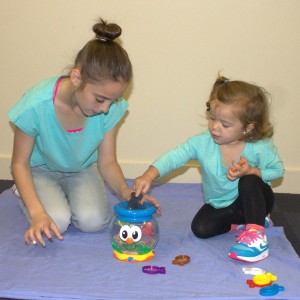 8. How to behave in different settings. As well as an inside voice there may be other behaviours your child may do that are not suited to a quiet, inside situation, such as running or climbing. Again you can take this opportunity to teach your child. Rather than telling your child off, you can tell them what to do and why, such as "please walk, because it is not safe to run inside. There is not enough space and you may bump into people." or "please wait for me and hold my hand when we go outside. There are cars driving in the car park and I need you to be safe". If your child has limited language you may need to make this simpler such as "walk slowly" or "wait - hold hands".
8. How to behave in different settings. As well as an inside voice there may be other behaviours your child may do that are not suited to a quiet, inside situation, such as running or climbing. Again you can take this opportunity to teach your child. Rather than telling your child off, you can tell them what to do and why, such as "please walk, because it is not safe to run inside. There is not enough space and you may bump into people." or "please wait for me and hold my hand when we go outside. There are cars driving in the car park and I need you to be safe". If your child has limited language you may need to make this simpler such as "walk slowly" or "wait - hold hands".
9. Being considerate of others. Other people including many children in a shared space offers a chance to help your learn to child be aware of others and to behave considerately. Again tell them clearly what to do and why such as "This boy wants to play with the bus too. Please let him have a turn now." or "These people were before us in the line. When they have finished you can buy your juice." Also tell your child when you notice them doing something considerate " I liked the way you shared the puzzle with James".
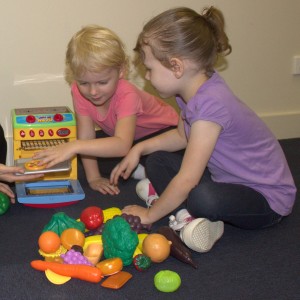 10. Packing up. This is a super useful skill and if you are lucky your child may even start to do it at home! Model the behaviour you want by putting your magazine away and telling your child what you are doing. "I'm putting this away so it's tidy and someone else can use it", then ask them to do the same with the toys. "You put the toys back so the floor is tidy too". Help your child if they need it and praise them when it's done. "Good job, now it's nice and tidy and the floor is safe for people to walk". If your child has limited language use simple phrases "pack up" or "put back".
10. Packing up. This is a super useful skill and if you are lucky your child may even start to do it at home! Model the behaviour you want by putting your magazine away and telling your child what you are doing. "I'm putting this away so it's tidy and someone else can use it", then ask them to do the same with the toys. "You put the toys back so the floor is tidy too". Help your child if they need it and praise them when it's done. "Good job, now it's nice and tidy and the floor is safe for people to walk". If your child has limited language use simple phrases "pack up" or "put back".
Talking Matters provides assessment, diagnosis,therapy and support for child with a wide range of needs including developmental delays, learning and literacy challenges, speech and language delays, motor skill and sensory issues and children on the autism spectrum and their families.We are providers under the NDIA. We provide speech pathology, occupational therapy, social skills and play skills groups. We provide services in local schools and our Autism Adviser can help teachers support children who are experiencing difficulties in school. To find out more about our services and our team visit our website.
Our website has a range of downloadable information sheets, printable activities and useful links. To connect with our community of families, therapists and educators join us on Facebook, Twitter and Pinterest.
Related Blog Posts
If you liked this post you may also like:
3 1/2 year olds
Gross motor skills
Using PLAY DOUGH To Grow
Helping Your Child Learn Online



